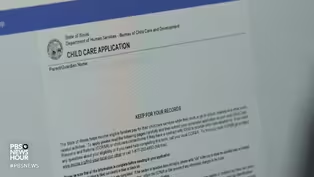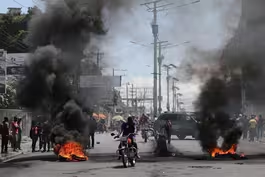
As migration surges, trafficking becomes a massive business
Clip: 3/11/2024 | 7m 13sVideo has Closed Captions
As migration surges, trafficking becomes a massive business
Amid a global migration surge, the trafficking industry has become a multi-billion dollar business. Mexican officials estimate as many as 6,000 people cross into Mexico every day from diverse places like Russia and Venezuela. Amna Nawaz heads south to Chiapas, Mexico where many migrants stop before continuing their journey to the U.S. border.
Problems playing video? | Closed Captioning Feedback
Problems playing video? | Closed Captioning Feedback
Major corporate funding for the PBS News Hour is provided by BDO, BNSF, Consumer Cellular, American Cruise Lines, and Raymond James. Funding for the PBS NewsHour Weekend is provided by...

As migration surges, trafficking becomes a massive business
Clip: 3/11/2024 | 7m 13sVideo has Closed Captions
Amid a global migration surge, the trafficking industry has become a multi-billion dollar business. Mexican officials estimate as many as 6,000 people cross into Mexico every day from diverse places like Russia and Venezuela. Amna Nawaz heads south to Chiapas, Mexico where many migrants stop before continuing their journey to the U.S. border.
Problems playing video? | Closed Captioning Feedback
How to Watch PBS News Hour
PBS News Hour is available to stream on pbs.org and the free PBS App, available on iPhone, Apple TV, Android TV, Android smartphones, Amazon Fire TV, Amazon Fire Tablet, Roku, Samsung Smart TV, and Vizio.
Providing Support for PBS.org
Learn Moreabout PBS online sponsorshipGEOFF BENNETT: We turn now to the migrant crisis that's gripping parts of the southern U.S., but has much wider implications.
Here's Amna Nawaz.
AMNA NAWAZ: Geoff, a senior U.S. official tells us amid a global migration surge that the trafficking industry is booming.
It's now a multibillion-dollar business, and that's led to unprecedented trends at the U.S. southern border.
But much of that begins here, 1,500 miles away, in Chiapas, Mexico.
As day turns tonight, the city of Tapachula transforms, and the streets of this southern Mexican hub fill with families from around the world.
Over the last three years, Tapachula, just a few miles from Guatemala, has become a global crossroads on the migrant path north.
Nelson, originally from Haiti, just arrived here in January with his wife and 1-year-old daughter.
NELSON, Haitian Migrant (through translator): Ninety-eight percent of Haitians that come through here want to go to the United States.
The reason I'm planning to stay here is because I'm thinking about my family, a better future for my children, because, in my country, there is no future.
AMNA NAWAZ: He left Haiti in 2012, spent years in Chile, and now hopes to call Mexico home, unlike, he says, most migrants who pass through.
NELSON (through translator): This is the easiest route to get to the United States.
That's why there are so many migrants here from around the world.
AMNA NAWAZ: Of the 195 recognized nations in the world, Mexican authorities have logged migrants from 120 of them coming across their southern border.
And those who pay smugglers are passed from handler to handler along the way, often staying in local hotels like these.
The U.S. or no?
But any attempt to speak with them...
But you're from Kazakstan?
You don't want to speak to us?
... is short-lived.
So this is part of the problem we're running into again and again here, is, a lot of people who are from countries that are not Latin American countries, from Russia, from India, a couple of guys I just met from Kazakstan, they're staying in these hotels, here but they have basically been told by the smugglers who are moving them not to talk to anyone.
Smugglers like Mario.
That's not his real name, and we agreed to protect his identity, for fear of cartel retribution.
But this former bank executive has worked in the human trafficking network since 2020.
Most people will look at what you do and say that you are a smuggler, you are a trafficker.
How do you describe what you do?
MARIO, Smuggler (through translator): At the beginning, yes, I felt like a criminal.
But as people have gotten to know me and now with my clients, I identify as someone who makes other people's dreams come true.
AMNA NAWAZ: Dreams come true.
What kind of dreams?
MARIO (through translator): I consider myself a facilitator of opportunities.
AMNA NAWAZ: He says he charges anywhere from $7,500 to $21,000 per person.
The tougher and longer the journey, from China or India, for example, the higher the cost.
Local Mexican officials and cartels take their cuts along the way.
He claims he has a nearly 100 percent success rate getting people into the United States.
"NewsHour" has no way to verify that claim.
MARIO (through translator): Without exaggerating, in the time that I have been working with this group, we have moved 50,000 people.
AMNA NAWAZ: In the last two-and-a-half years, you think you have moved 50,000 people, your entire network you work with?
MARIO (through translator): Yes.
And I think it's probably more.
AMNA NAWAZ: This river crossing is one of the paths Mario uses to move people into Mexico.
In this stretch of the Suchiate River, people and goods regularly move back and forth between Guatemala and Mexico.
But what we can't show you, out of security concerns, is an area just beyond the bridge behind me and another area about 100 yards ahead.
Those are completely in control of the human trafficking networks.
They're smuggling people from as far away as Congo, India and China.
But not everyone makes it.
Mario concedes this is a business and admits he has held migrants hostage until they paid what they agreed to, but he claims he's never physically harmed anyone.
But you know that many more people have been assaulted and have been treated badly and many more don't make it.
And you're participating in a system that keeps making sure that people continue on these pathways.
MARIO (through translator): And I have thought about it, but it's out of my hands, and I can't help them.
If they want to travel in a safe and secure way, they should have money.
AMNA NAWAZ: There are legal ways for people to enter the United States, and you're essentially helping them to get around the laws.
Why do it that way?
Why not help people to legally enter the United States?
If we help people enter legally, then it's not a business.
America Perez is with Jesuit Refugee Services.
AMERICA PEREZ, Jesuit Refugee Services (through translator): They're coming from multiple countries, Central America, from Haiti, from Cuba, from China, from Afghanistan, from Congo, from limitless number of places.
AMNA NAWAZ: Her organization helps with everything from travel documents to housing to health support.
She says city services are overwhelmed and local patience is running thin.
AMERICA PEREZ (through translator): There's no more space for new migrants.
They're sleeping on the streets next to the shelters or next to the stores.
Because we have had an increase in arrivals, you can see that people who live in Tapachula are unhappy.
There have been moments of xenophobia, dissatisfaction.
There have been instances where they won't hire people who come from other countries.
AMNA NAWAZ: Twenty-year-old Mariela has been looking for work for seven months.
She fled an abusive partner in Honduras with her 1-year-old daughter, Mia Belin (ph).
I asked what worries her most.
MARIELA, Honduran Migrant (through translator): That he will take my daughter away.
AMNA NAWAZ: She receives 5,000 pesos, or about $300, in federal support a month, but that doesn't cover food and diapers and housing.
So she wants to head north to the U.S. or wherever she says she can find a job.
MARIELA (through translator): I have heard the journey is dangerous, but, as a mother, I'm willing to risk it all for my child.
AMNA NAWAZ: Mario says, no matter who's in charge in the U.S. and whatever the restrictions, he always finds a way to get people in.
So you pay close attention to what U.S. officials say, because that impacts who you move and how you move them; is that fair?
MARIO (through translator): Yes, it's part of our job to be informed so that we know what we can offer people.
This will never end.
There is always a way to cross the border.
There is always a way.
AMNA NAWAZ: Officials here estimate as many as 5,000 or 6,000 people crossing into Mexico every day, and many of them do make their way north to the U.S., fueling record border numbers last fiscal year.
Those numbers are growing increasingly diverse in recent years and are challenging an already stressed U.S. immigration system in new ways.
We will have more from that U.S.-Mexico border tomorrow.
29-year-old becomes first U.S. woman to sail around world
Video has Closed Captions
Clip: 3/11/2024 | 7m 12s | 29-year-old becomes first American woman to sail nonstop around the world (7m 12s)
Bureaucratic hurdles let some slip through U.S. safety net
Video has Closed Captions
Clip: 3/11/2024 | 7m 33s | How a complicated benefits system lets some fall through the safety net (7m 33s)
Gangs edge Haiti to brink of collapse
Video has Closed Captions
Clip: 3/11/2024 | 8m 42s | Gangs edge Haiti to brink of collapse as regional leaders seek solutions (8m 42s)
Tamara Keith and Amy Walter on immigration in the election
Video has Closed Captions
Clip: 3/11/2024 | 9m 27s | Tamara Keith and Amy Walter on Biden vs. Trump on immigration (9m 27s)
Texas agriculture sees long road ahead after massive fires
Video has Closed Captions
Clip: 3/11/2024 | 7m 1s | Texas farmers and ranchers see long road of recovery ahead after devastating wildfires (7m 1s)
Providing Support for PBS.org
Learn Moreabout PBS online sponsorship
- News and Public Affairs

FRONTLINE is investigative journalism that questions, explains and changes our world.

- News and Public Affairs

Amanpour and Company features conversations with leaders and decision makers.












Support for PBS provided by:
Major corporate funding for the PBS News Hour is provided by BDO, BNSF, Consumer Cellular, American Cruise Lines, and Raymond James. Funding for the PBS NewsHour Weekend is provided by...




